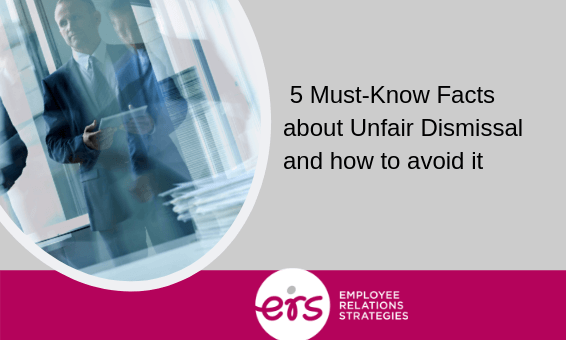A recent case [1] highlights the need to make sure you get the process right in a ‘genuine redundancy’ matter.
The Fair Work Act 2009 provides an exclusion from a claim for unfair dismissal[2] in the case of a genuine redundancy, but you must also meet the stated requirements. In the case referred to above, the company made the mistake of not conducting a proper process of consultation with the employee (Mr Arnold). This meant that a claim for unfair dismissal was possible, although fortunately for the employer in the case, damages were not awarded against it.
The dismissal was due to the economic downturn in WA but also due to an award change that meant Mr Arnold could no longer be engaged on a ‘commission only’ basis and he had failed to meet sales targets.
The company restructured by moving to smaller premises, retrenching a receptionist and buying out a Director, then shifted its focus from sales to property management. This meant that Mr Arnold was no longer needed.
Unfortunately, the company did not follow a proper process of consultation allowing for a claim by Mr Arnold that he had been unfairly dismissed, and he sought monetary compensation of $11,000.
The Fair Work Commission in making its decision to reject the claim took into account the fact that there was a valid reason for the dismissal and relied on earlier decisions which set the precedent that where the lack of consultation would not have changed the “operational reasons for the dismissal or lead to any other substantive change”, then the dismissal was not harsh, unjust and unreasonable. The Commission also considered the lack of human resource expertise in the small business of the employer and may well have taken a different approach in a larger, better resourced company.
Genuine Redundancy explained
The Fair Work Act 2009 provides the following steps for an employer to follow to be able to claim the “genuine redundancy” exclusion from an unfair dismissal claim:
- that the redundancy is indeed genuine e.g. provide evidence that the employee has not been replaced and the role will not be performed by someone else;
- meet any formal consultation requirements under an Award or Enterprise Agreement; and
- have considered any redeployment opportunities.
The requirement to consult with the employee(s) affected by the decision involves meeting the requirements of clause 8 Consultation about major workplace change under modern awards and similar clauses under Enterprise Agreements summarised as follows:
- provide notice of the changes once a definite decision has been made to implement them and arrange meeting(s) to discuss the change/s.
- write to the employee(s) affected and their representatives (if any) with all relevant information about the change/s.
- commence discussions as soon as possible by arranging relevant meetings.
- the employer must promptly consider any matters raised by the employee(s) and follow up and respond to any matters raised by the employee(s) before a final decision to dismiss an employee(s) is made.
Lessons to learn
- In a redundancy situation it is crucial to meet the ‘genuine redundancy’ requirements, to be able to avoid an unfair dismissal case.
- Formal consultation requirements must be met before the dismissal takes place.
- In a challenge to the dismissal the Commission will review the consultation process and satisfy itself that the employer has responded and properly considered the matters raised by the employee(s).
- Where there is a valid reason for dismissal, the earlier precedents support a rejection of a claim for unfair dismissal. However, employers should get the process right to avoid the inconvenience and cost of defending an unfair dismissal case.
- A lack of human resource expertise may help a smaller business to defend an unfair dismissal case, but this will not be available for larger companies.
- Getting advice from ER Strategies in similar situations will save our clients a lot of time and resources.
[1] David Arnold v Real Estate Mt Hawthorn Pty Ltd T/A Oxford Property Group [2019] FWC 5446
Need help with employee termination or other employee relations issues? Contact us on 1300 55 66 37.
You might also want to read


